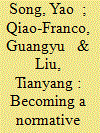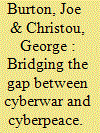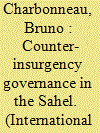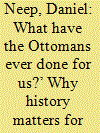|
|
|
Sort Order |
|
|
|
Items / Page
|
|
|
|
|
|
|
| Srl | Item |
| 1 |
ID:
185563


|
|
|
|
|
| Summary/Abstract |
Maintaining robust diplomatic relationships with neighbouring countries in the Mekong region has become strategically critical to China. Since President Xi Jinping took office, China has been renovating normative power in the Mekong region, endeavouring to socialize the Mekong countries into accepting normative Chinese concepts, such as ‘community of shared destiny’, by mobilizing and reconfiguring their material and normative recourses. This article argues that China's normative power stems from two primary mechanisms: 1) an organized, top-down diffusion driven by political elites, involving inter-governmental dialogues, socialization via bilateral and multilateral cooperation mechanisms, and negotiations with countries co-opted into China-led connectivity and infrastructure initiatives; 2) a bottom-up diffusion of ideas from practices (i.e. exchange of goods, trade, aid) and the physical presence of China in the Mekong region, exemplified by the massive scale of infrastructure widely constructed in the region. Taken together, China's expanded normative engagement in the Mekong subregion is comprised of multiple, oscillating modes of normative production that have been ‘synchronized’ across riparian countries with varied geoeconomic and geopolitical circumstances. Our findings suggest that while normative Chinese discourses have been accepted by the ruling classes of certain Mekong countries, China's attempts to build normative power have been largely shunned by the civil societies in the region.
|
|
|
|
|
|
|
|
|
|
|
|
|
|
|
|
| 2 |
ID:
185564


|
|
|
|
|
| Summary/Abstract |
The conceptual debate around the term cyber warfare has dominated the cybersecurity discipline over the last two decades. Much less attention has been given during this period to an equally important question: what constitutes cyber peace? This article draws on the literatures in peace and conflict studies and on desecuritization in critical security studies, to suggest how we might begin to rearticulate the cybersecurity narrative and shift the debate away from securitization and cyberwar to a more academically grounded focus on desecuritization and cyber peace. It is argued that such a move away from a vicious circle where states frame cybersecurity predominantly within a national security narrative and where they seek to perpetually prepare for cyberwar, to a virtual cycle of positive cyber peace, is not only a desirable, but a necessary outcome going forward. We assert that this is particularly important if we are to avoid (continuing) to construct the very vulnerabilities and insecurities that lead to the prioritization of offence and destruction in cyberspace, rather than transformative, human-centred development in information and communications technology innovation.
|
|
|
|
|
|
|
|
|
|
|
|
|
|
|
|
| 3 |
ID:
185572


|
|
|
|
|
| Summary/Abstract |
Global trade governance is increasingly characterized by a growing fragility in multilateral institutions and a preference for bilateral negotiations. The literature on such negotiations focuses primarily on successful agreements. Academic research on unsuccessful or stalled bilateral talks is limited, although better understanding of such outcomes may provide lessons for future negotiations. This article contributes to such understanding by proposing a revised open economy politics (OEP) framework, adapted to ‘second generation’ OEP analysis. Our framework highlights the multidirectional linkages between the trinity of interests, institutions and international interactions within trade negotiations, while adding the role of power and ideas to the analysis. We leverage our revised framework to explore why the European Union–India Free Trade Agreement (EUIFTA) negotiations stalled, thus providing insights as negotiators seek to revive them. Drawing on 45 semi-structured interviews conducted over a seven-year period in the EU and India, we examine what impact these different factors had on the progress of talks. Our results suggest that our revised OEP approach provides a multi-layered and integrated framework which enables us to better understand negotiating outcomes. Furthermore, our findings suggest that the shifting balance between emerging economies and developed economies as a result of the geopolitical (power) shifts and ideational change will affect future trade negotiations.
|
|
|
|
|
|
|
|
|
|
|
|
|
|
|
|
| 4 |
ID:
185570


|
|
|
|
|
| Summary/Abstract |
How do disasters influence conflict and diplomacy in conflict areas? The scholarship shows that while they can provide opportunities for cooperation and ‘disaster diplomacy’ between parties to a conflict, they can also intensify tension and hostility. This article uses the Israeli–Palestinian conflict during the COVID-19 pandemic as a case study, exploring the impact of the crisis on relations between the rival parties and examining the conditions under which an ongoing pandemic might lead to either conflict or cooperation in a conflict area. The research is based on within-case analysis, comparing three conflict arenas: Israel–Palestinian Authority relations in the West Bank; relations between Israel and the Palestinian community in East Jerusalem; and Israel–Hamas government relations in the Gaza strip. The article outlines the possibilities and limitations of ‘disaster diplomacy’ in intractable conflicts and contributes to the literature by identifying how different contexts, relations and actors in each conflict arena affect the development of patterns of conflict and cooperation with regard to the pandemic. The study analyses the factors that shape how the pandemic affects the conflict, and the COVID-19-related diplomacy, in each sub-case, with attention to three main variables: the structure of the conflict arena, domestic politics and the developments in the pandemic. The analysis addresses the unique conditions of an ongoing global pandemic, as opposed to an isolated disaster event, and traces the changing impact of the pandemic on the conflict and on disaster-related cooperation at various stages.
|
|
|
|
|
|
|
|
|
|
|
|
|
|
|
|
| 5 |
ID:
185568


|
|
|
|
|
| Summary/Abstract |
Since 2013, the multiplication of regional and international strategies and actions directed at stabilizing Mali and the Sahel, and at countering and preventing violent extremism, has not improved the situation there and, arguably, some of it has made it worse. This article analyses the type of political order and regional governance that has been and is being built after almost a decade of international interventions in the West African Sahel. It is an effort at theorizing and making sense of what is considered here to be a permanent state of intervention in the Sahel that has evolved into a form of counterinsurgency governance—a concept being proposed to point to the influence and the infusion of counterinsurgency principles into philosophies of governance. This article argues that counterinsurgency governance insists on a set of power relations and configurations that seeks to impose limits, parameters and boundaries to the purpose of and the form that Sahelian states, governments and governance ought to take. As such, counterinsurgency governance is simultaneously a mode of governance and a web of political practices and contestation whose mechanisms have failed at fully implementing its principles in the Sahel. Its fallback is the emergence of a regional strategy to manage and establish limits to Sahelian political possibilities.
|
|
|
|
|
|
|
|
|
|
|
|
|
|
|
|
| 6 |
ID:
185562


|
|
|
|
|
| Summary/Abstract |
Decapitation strategies have often been linked to counterterrorism. The existing literature suggests the results of these strategies are mixed. Previous studies suggest that the death of a prominent leader may not necessarily end the crisis; it all depends on the group's infrastructure, ideology, leadership traditions, and extent of its penetration in society. This article takes a critical look at the impact of a recent leadership decapitation in Nigeria. Abubakar Shekau, the leader of the Boko Haram movement in the Lake Chad Basin countries, was killed on 19 May 2021 by a faction of the movement known as the Islamic State of West African Province (ISWAP). This article argues that Shekau's case has paradoxically helped to strengthen ISWAP's position, giving it new recruits and other resources and perhaps most importantly reinforced its position with local communities. This has implications for the Nigerian state, its neighbours and, because of Boko Haram's links to ISIS, the wider war on terrorism.
|
|
|
|
|
|
|
|
|
|
|
|
|
|
|
|
| 7 |
ID:
185566


|
|
|
|
|
| Summary/Abstract |
The research problem this article addresses is whether the unique confluence of overseas security forces in a single territorial space through the leasing of land for foreign military bases compromises the state's sovereignty. We study Djibouti's practice of renting land to military powers from an analytical position that is diametrically opposed to the literature on the ‘scramble’ for Africa and often erroneous assumptions of an erosion of sovereignty. Using the concept of ‘worlding’, we argue in this article that instead of reading ‘military base diplomacy’ as eroding and undermining Djibouti's sovereignty, this case demonstrates the ways in which ‘the art of being global’ underpins new forms of territoriality and unexpected forms of locality in Africa. Consequently, we maintain that African experiences of sovereignty offer the challenges, along with the rewards, of greater analytical depth to International Relations scholarship while expanding our understanding of different empirical cases beyond the western-centric accounts of sovereignty in line with an abstract ideal that does not tell us much about the world, postcolonial experiences and global politics. Through a case-study approach, we focus specifically on the stark distinctions between Japan and China, which both have their respective first postwar overseas military bases in the country, and the Djiboutian state itself, in terms of how each are interpreting and practicing sovereignty to fit their own national narrative, international status and domestic legal frameworks. The findings challenge simplistic analyses of African states as victims of exploitative Great Powers, gradually and repeatedly being stripped of their sovereignty.
|
|
|
|
|
|
|
|
|
|
|
|
|
|
|
|
| 8 |
ID:
185574


|
|
|
|
|
| Summary/Abstract |
This article contributes to the understanding of authoritarian states as norm entrepreneurs of content control norms. These emerging norms challenge the norm literature, which disregards illiberal norms and illiberal actors as norm entrepreneurs. This article focuses on two distinct but coexisting strategies that Russia and China apply for promoting and developing internet governance norms. It shows that these countries use a combination of socialization and persuasion strategies. They employ a sequencing strategy of regional coalition-building in order to create support, after which they expand a norm's range via international organizations. These norm entrepreneurs adapt their strategies to different target groups based on the degree of internalization of the norm. The article shows that a reassessment of norm theory in a broader context allows for extension to illiberal norms and illiberal actors, but also shows the limits since the applicability of strategies such as naming and shaming should be questioned.
|
|
|
|
|
|
|
|
|
|
|
|
|
|
|
|
| 9 |
ID:
185573


|
|
|
|
|
| Summary/Abstract |
As the Sino-American Great Power competition continues to intensify, newly-elected US President Joe Biden's administration now seeks to enlist the support of its allies and partners around the world. As Europe's largest economy and a, if not the, leading voice within the European Union, Germany represents an important puzzle-piece for Biden. But Germany, at least under outgoing chancellor Angela Merkel, has been reluctant to take sides. It is against this backdrop that this article looks into Germany's past and present trilateral relationships with the US and China through the theoretical lens of the so-called strategic triangle approach. Applying this approach, the article seeks to trace and explain German behaviour, as well as to elucidate the opportunities and pitfalls that have come with it. The article demonstrates that Germany's recently gained position as a ‘pivot’ (two positive bilateral relationships) between the US and Chinese ‘wings’ (positive bilateral relations with Germany and negative bilateral relations with each other) is desirable from the perspective of the strategic triangle. At the same time, being pivot is also challenging and hard to maintain. Alternative options, such as entering a US–German ‘marriage’ directed against China, are also problematic. The article therefore concludes that Germany has tough decisions to take going forward.
|
|
|
|
|
|
|
|
|
|
|
|
|
|
|
|
| 10 |
ID:
185575


|
|
|
|
|
| Summary/Abstract |
China's ascendancy as a global development actor has significant implications for geostrategic dynamics and international development. While the push to ‘go out’ has been seen as a major strategy of the Chinese state, the actors are increasingly diversifying, including Chinese state agencies, businesses and non-governmental organizations (NGOs). We analyse the inconspicuous but important involvement of international NGOs (INGOs) in China's globalizing strategy. Drawing on in-depth interviews, we develop an integrated framework for INGOs as intermediaries in China's ‘going out’ strategy, based on the content of intermediary support (tangible vs intangible resources) and the function of the intermediary (bridging vs initiating). These intermediary roles have implications for how INGOs navigate conflicts between their domestic work in China and their outbound efforts, INGO legitimacy as actors that promote global norms or as ambassadors of the party-state, and the extent to which they facilitate Chinese expansion and soft power or shape China's global engagement. We show how INGOs as northern actors continue to play a role in South–South Cooperation. Our findings shed light on how global civil society chooses to invest its significant material and discursive resources, and how global actors under authoritarianism internalize, resist or promote its projects.
|
|
|
|
|
|
|
|
|
|
|
|
|
|
|
|
| 11 |
ID:
185577


|
|
|
|
|
| Summary/Abstract |
International organizations (IOs) play a key role in promoting multilateral cooperation on critical transnational issues. Yet, their authority has increasingly been contested by member states that cut financial contributions or even withdraw their membership. How do IOs respond to such contestation? While the existing literature has mostly focused on reactions by other member states, I argue in this article that our understanding of IOs' responses to contestation remains incomplete without an analysis of IO bureaucracies. I propose a conceptual framework to analyse three types of bureaucratic responses: inertia, i.e. no immediate response; adaptation, i.e. institutional changes to maintain the support of the challenging member state(s); and resilience-building, i.e. developing organizational capacities to limit contestation. I argue that each of these responses is shaped by specific bureaucratic mechanisms, namely hunkering, negotiation, framing, coalition-building, shaming and professionalization. Based on a comparative within-case study analysing the reactions of the United Nations Population Fund (UNFPA) to budget cuts by the Reagan, Bush and Trump administrations, I further theorize that the organization's threat perception, the position of other member states and bureaucratic leadership are relevant factors that need to be considered to explain the variation in IO responses to contestation.
|
|
|
|
|
|
|
|
|
|
|
|
|
|
|
|
| 12 |
ID:
185565


|
|
|
|
|
| Summary/Abstract |
Somaliland's endurance as Africa's longest de facto state has for decades preoccupied scholarship on state formation and democratization. The prevailing democratic success narrative has, however, downplayed the complex internal political dynamics and crises that have characterized Somaliland's independence since 1991. Relying on a number of robust resources, including 110 interviews and archival work conducted in Somaliland from 2015 until 2021, this article examines at close range Somaliland's political economy and provides a more cautious assessment of Somaliland's democratization trajectory. It argues that the political authority of cross-border oligarchic–corporate structures and the securitization of aid created an ‘oligopolistic state’ and ‘peaceocracy’ rather than a national, democratic government. This analysis highlights how de facto states struggle to balance political control and financial hardship generating creative and uneven governance structures. This study also raises important questions about how donors in the Gulf and in Asia provide new opportunities for recognition through Islamic finance and business that may affect de facto states' commitments to democratization. Finally, it contributes to theorizing about the ideologies of privatized governance that emerge in peripheral and developing economies and the political consequences of perennial non-recognition.
|
|
|
|
|
|
|
|
|
|
|
|
|
|
|
|
| 13 |
ID:
185567


|
|
|
|
|
| Summary/Abstract |
While there is a growing interest in conflict-related sexual violence (CRSV) against men, conceptual understanding and empirical knowledge are still inadequate. The notion of spiritual security is introduced in this article as an explanatory variable in CRSV, using survivors' discursive views of sexual violence victimizations in Nigeria's north-eastern region. The CRSV of males, it is argued, may also be understood as a ritual or spiritual activity carried out for bodily protection, financial prosperity, or socio-political ascendency. The survivors' impressions of CRSV's spiritual undertones are not unrelated to the heteronormative and collectively homophobic culture in their society, in which violent same-sex relations are considered so perverse and meaningful only if they are conceived as ‘evil or devilish practices’. Spiritual beliefs and practices, on the other hand, determine much of the social reality of many people in various parts of the world, and they are regarded as potent on security issues ranging from physical protection to wealth creation and socio-political advancement. This study adds to the continuing discussion on the reasons behind CRSV against men.
|
|
|
|
|
|
|
|
|
|
|
|
|
|
|
|
| 14 |
ID:
185561


|
|
|
|
|
| Summary/Abstract |
The outbreak of COVID-19 in early 2020 provided cover for some states to take strict and hostile measures against refugees and asylum seekers, thereby privileging self-regarding over other-regarding or cosmopolitan-oriented policies. The hostile measures, which have included detentions, pushbacks and other refugee deterrence actions not only appeared to shake the refugee system, but they increased the vulnerability of asylum seekers and refugees who continued to be exposed to torture, drownings at sea, trafficking and sexual violence. This development, which included a fine-tuning of some measures that had been hatched before the emergence of COVID-19, appeared to set back efforts to nurture the bonds of global human solidarity and expand moral and ethical boundaries beyond state borders. However, the international refugee regime continues and is supported by many states and other international actors that seek to emphasise cosmopolitan and other-regarding policies. The resilience of the refugee system underlines the fact that international society has a practical and moral basis to challenge exclusionist policies towards asylum seekers and refugees, prevent future harm that might result from asylum deterrence policies and develop more humane forms of international refugee governance.
|
|
|
|
|
|
|
|
|
|
|
|
|
|
|
|
| 15 |
ID:
185569


|
|
|
|
|
| Summary/Abstract |
Scholars of Middle East politics have been reluctant to explore how the long nineteenth century has shaped the region's political development. The reason for this neglect, I argue, is a common understanding of Ottoman decline and failed modernization, which suggests that the story of modern politics in the Middle East commences with colonial partition after the First World War. But what if political scientists are getting the story wrong? In this article, I argue that our background assumptions about the political development of the Middle East reflect outdated understandings that historians themselves have long left behind. Drawing on this revisionist Ottoman historiography, I show that key dynamics in Middle East politics today—such as state-building and sectarian identities—originate not in the era ushered in by the Sykes–Picot Accord, but in the transformations of the long nineteenth century. By overlooking the evolution of late Ottoman politics and their historical legacies, political scientists risk misdiagnosing key dynamics in the region's political development. ‘Bringing the Ottomans back in’ highlights to policy-makers the importance of the extra-institutional dimensions of statebuilding in the Middle East, and opens up new vistas for research in comparative–historical political science.
|
|
|
|
|
|
|
|
|
|
|
|
|
|
|
|
| 16 |
ID:
185571


|
|
|
|
|
| Summary/Abstract |
The election of Donald Trump posed an existential challenge to NATO. At the end of his tenure, however, the US president had neither withdrawn membership nor substantially undermined the alliance from within. This article helps explain the puzzle of why NATO survived Trump's presidency. Extant explanations emphasize domestic factors such as the US foreign policy machinery and entrenched liberal ideology, structural reasons and Trump's idiosyncratic personality. While these accounts possess some explanatory value, they remain incomplete as they omit one central factor: NATO's leadership. Drawing on more than twenty original interviews with senior officials, the article demonstrates that particularly Secretary-General Stoltenberg's strategic responses were a necessary factor in changing Trump's stance on burden-sharing and helped maintain a robust deterrence policy toward Russia. These findings carry important implications both for theoretical debates on international organizations' agency in fending off contestation and policy debates on which actors shape NATO by emphasising the hitherto understated role of the secretary-general.
|
|
|
|
|
|
|
|
|
|
|
|
|
|
|
|
|
|
|
|
|